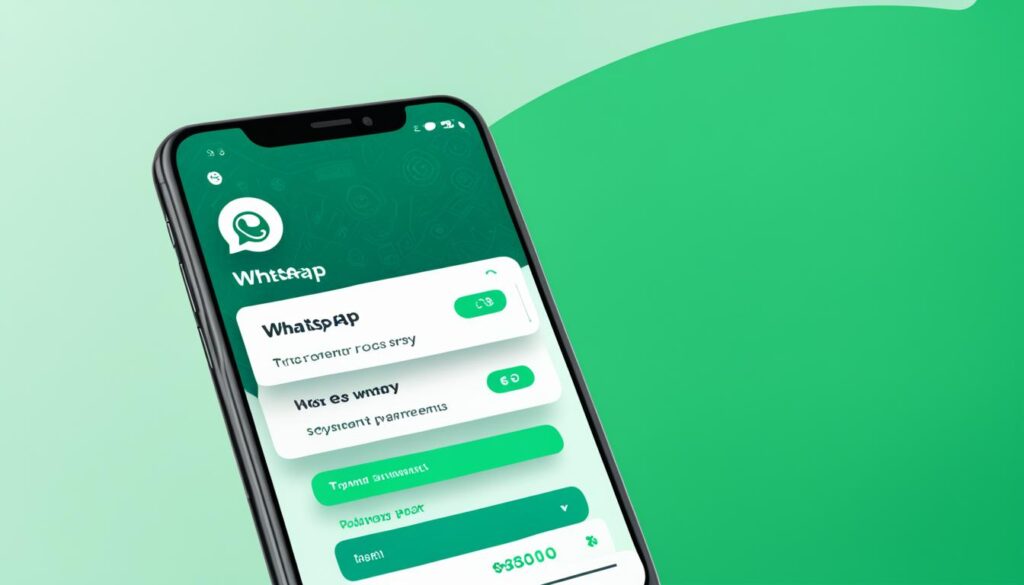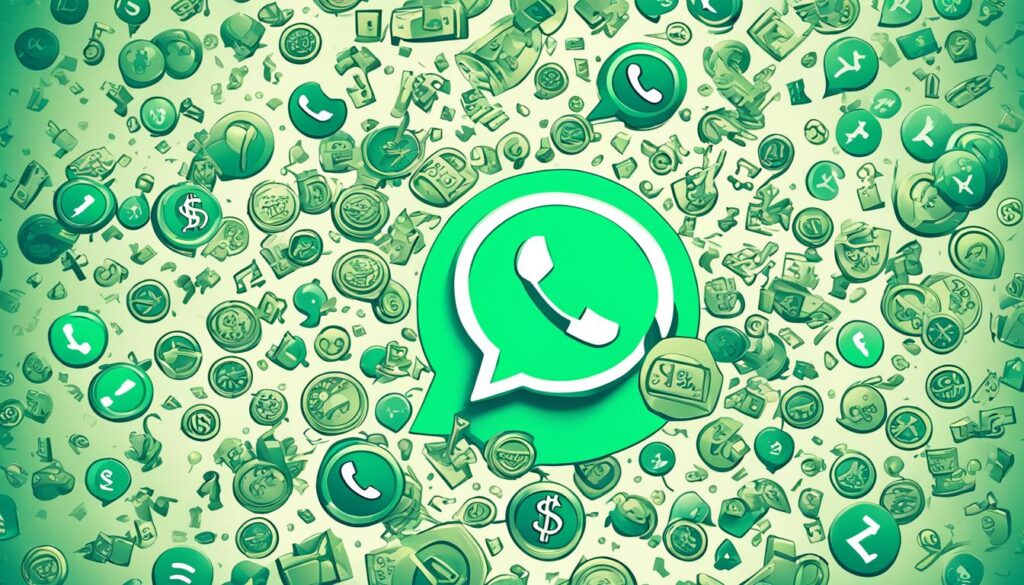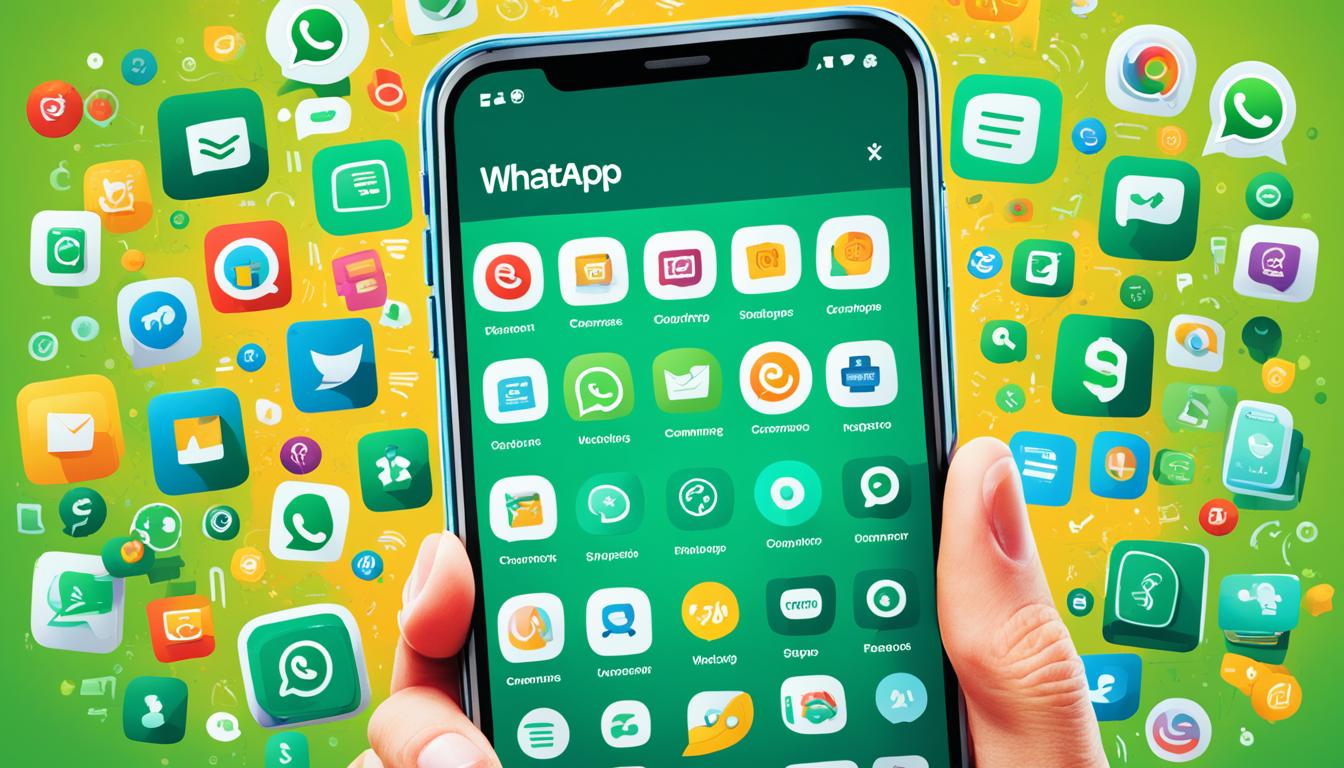“As an Amazon Associate I earn from qualifying purchases.”
Every day, when you click on that familiar green icon, you join over 2 billion users. WhatsApp has become a vital part of our lives, blending into both personal and work spaces. But have you ever wondered how WhatsApp earns money when sending messages is free?
Looking into WhatsApp’s revenue model reveals more than just unique ways to make money. It shows how our world has evolved. Now, value comes from connections and conveniences, not just money. Let’s explore how WhatsApp breaks the norm and supports its huge network around the globe.
Key Takeaways
- Understanding WhatsApp’s unique approach to generating income.
- Revealing the ingeniously subtle monetization tactics at play.
- Identifying the core components that make up the WhatsApp revenue model.
- How does WhatsApp make money in a seemingly ‘free’ landscape?
- In-depth look at WhatsApp’s pivot from user payments to business-centric features.
The Genesis of WhatsApp and Its Acquisition by Meta Platforms
In 2009, a groundbreaking app called WhatsApp was born, thanks to Brian Acton and Jan Koum. It was an answer to high SMS fees, offering a cheaper way to message people worldwide. This idea quickly won over users everywhere.
The app’s early days had a unique WhatsApp subscription model. For about $1, users enjoyed a new kind of messaging. This approach helped WhatsApp grow strong and steady.
The Subscription Model: WhatsApp’s Early Revenue Strategy
WhatsApp’s subscription fee was key at the start. It meant smooth messaging for a small price. Users saw real value in paying little for unlimited messages.
From Paid Downloads to Free Messaging: A Shift in Monetization
WhatsApp changed its game plan by becoming a free app. This move opened doors to many more users. It was a big step in changing how we communicate online.
| Year | Business Model | User Impact | Revenue Source |
|---|---|---|---|
| 2009-2013 | Subscription | Steady Growth | User Fees |
| 2014-Present | Free Use | Exponential Increase | Diverse, Including WhatsApp Business API |
The buyout of WhatsApp by Meta Platforms in 2014 was a game-changer. WhatsApp grew to be a key part of Meta, constantly finding new ways to make money and improve.
WhatsApp’s Transition to a Free Platform
WhatsApp made a bold move by ending its $1 fee, stepping into a new chapter. This shift to a free platform changed how it made money and led to more users. Taking such risks in their business plan was key for staying relevant.
Eliminating the $1 Fee: Impact on Revenue and User Base
Removing the fee was a risky yet smart decision for WhatsApp. It welcomed more users worldwide, increasing the app’s reach. At first, it lost some revenue since it stopped collecting fees from users. However, this strategy aimed at attracting a larger user base to open up new income opportunities later.
Getting rid of the cost attracted many new users to WhatsApp. This growth did not just strengthen the app’s market presence. It also supported Meta Platforms’ vision of a globally connected community.
User Growth: The Key Focus Post-Monetization Shift
After becoming free, WhatsApp refocused on growing its user base. This wasn’t just about dropping prices; it was a strategic move to win over the market. This strategy aimed to draw in businesses and advertisers by building a large user community. WhatsApp prepared to launch new features and services as future income sources.
In the end, this shift highlights how crucial user growth is in today’s digital world. By giving up short-term gains from fees, WhatsApp is building a business model. This model is about bringing in more users and ensuring long-term financial growth.
Understanding the WhatsApp Business API
Businesses aim to improve customer engagement. They seek effective ways to make their interactions matter. The WhatsApp Business API is one such solution, perfect for medium to large businesses. It helps them talk to customers on a large scale. This tool changes how businesses chat with customers, making every conversation a chance to increase revenue through conversation.
How Businesses Utilize WhatsApp’s API for Customer Engagement
The WhatsApp Business API lets companies organize, automate, and reply to messages fast. It supports services like customer help and sending personalized updates. Here are the key ways businesses use the API:
- Automated Messaging: Sending instant replies to common questions.
- Order Updates: Giving updates about purchases and deliveries instantly.
- Customer Support: Providing help any time and arranging services.
The table below shows how different sectors use the API:
| Industry | Usage Example | Customer Engagement Benefit |
|---|---|---|
| Retail | Sharing product catalogs and facilitating purchases | Enhanced shopping experience and immediate assistance |
| Travel | Sending itineraries and offering booking services | Streamlined travel planning and real-time updates |
| Banking | Transaction notifications and fraud alerts | Increased security awareness and financial management |
| Healthcare | Appointment reminders and health tips | Improved patient care and service accessibility |
Revenue Through Conversation: Charging for Delayed Responses
The API boosts customer engagement. There’s a new pricing model now. If businesses reply late to messages, after 24 hours, they pay a fee. This encourages fast replies, turning chats into revenue through conversation. This pricing helps keep customer service quality high.
Using the WhatsApp Business API not only improves customer engagement but also offers a new way to make money. It makes every message a chance to add to profits.
The WhatsApp Business API is key for better customer talks. It’s essential for building a responsive, engaging, and profitable chat service. Now is the best time to explore the API’s benefits. See how it can help your business make more money from revenue through conversation.
Introducing WhatsApp Payments: The P2P Revolution
The arrival of WhatsApp payments marks a big step in making the popular app even more useful. Now, you can pay back friends, split bills, or send money as easily as sending a message. Just imagine, no more scrambling for cash or bank details.
It’s important to understand how WhatsApp Payments works. It’s safe, with the same privacy you get in chats. This feature isn’t just convenient; it can also help many people manage their money better.

WhatsApp Payments could change how we deal with banks by making payments simpler. It’s a quiet way to handle money that could make transactions faster. It could also make competition among payment services fiercer.
Here’s what makes WhatsApp payments special. It turns sending money into a part of chatting. No need to leave your conversation:
- Easy setup right in the app
- Secure bank linking through UPI
- Quick money transfers in chats
What does this mean for WhatsApp? It could make the app a big deal in the digital money world. Right now, it doesn’t make money from payments. But, this could attract more people to the app. It might lead to new ways for WhatsApp to earn in the future.
Imagine dealing with money as easily as sharing jokes or planning outings. WhatsApp payments could change how we talk about money. Are you ready to be part of this change? Your next chat on WhatsApp could be the beginning.
WhatsApp Business: Monetizing User Communication with Companies
In today’s world, making money from user chats is key for growing your business. WhatsApp Business lets companies talk directly with customers. This personal touch can lead to more sales.
WhatsApp Business focuses on making customer relationships better. It offers in-app purchases and digital goods. These features make it easy to chat and shop at the same time. This can really boost a company’s earnings.
In-App Purchases and Digital Goods: Future Revenue Streams
Think about buying stuff without leaving your chat. WhatsApp Business is making this happen. It’s a win-win: easy shopping for users and big earnings for businesses.
Now, let’s look at how WhatsApp Business can help make more money:
| Feature | Description | Monetization Impact |
|---|---|---|
| Catalogs | Visual showcases embedded within chats | Direct in-chat sales leading to increased conversion rates |
| Quick Replies | Pre-programmed responses for efficient communication | Time-saving interaction that can speed up the sale process |
| Automated Messages | Messages sent automatically based on triggers | Enhanced user engagement even outside of business hours |
| In-App Purchases | Users complete transactions without leaving the app | Higher impulse buys and user retention rates |
Chatting isn’t just talking anymore. With WhatsApp Business, chats turn into money-making opportunities. This new approach boosts sales quietly but effectively. It makes both customers and businesses happier.
Monetizing User Data: A Data-Driven Business Model
In this digital age, data is like new oil. The idea of WhatsApp monetizing user data has become real. WhatsApp uses the vast amount of user interactions for new ways to make money. Think about the possibilities when messages, location shares, and contacts become chances for specific ads.
But what does this mean in the real world? Let’s examine how WhatsApp is great at turning data into profit.
Targeted Advertising on Other Platforms: Expanding Monetization Beyond Messaging
WhatsApp doesn’t show ads. So, how do they make money? The secret is in using data smartly with other Meta platforms. WhatsApp improves targeted advertising on big networks like Facebook and Instagram. This matches ads with potential customers incredibly well.

Advertisers pay a lot to reach the right audience. This is data monetization working well. It changes simple data into active money-making opportunities.
Data Monetization: Selling Insights and Value-Added Services
Besides ads, WhatsApp thinks about selling data insights and analysis to companies. This info helps businesses understand and reach their audiences better.
| Monetization Strategy | Description | Value to Businesses |
|---|---|---|
| Targeted Advertising | Using user data to target ads accurately on platforms like Facebook and Instagram. | Improved sales chances by tailoring ads to user interests. |
| Data Insights | Selling anonymous data patterns and stats to interested firms. | Helps in making strategic choices based on real data trends. |
| Value-Added Services | Providing special analysis services for in-depth market trend studies. | Gives a competitive edge through a better market understanding. |
For you, WhatsApp stays free and crucial. But for advertisers and businesses, it offers a unique way to understand and reach potential buyers like never before.
Strategic Partnerships: Expanding WhatsApp’s Revenue Horizons
Exploring strategic partnerships helps expand WhatsApp’s revenues. These partnerships enhance WhatsApp’s services and drive revenue growth. They integrate features like food ordering and travel bookings into the app, making it a go-to platform.
These partnerships simplify life for millions of users by allowing various tasks without leaving WhatsApp. This not only benefits users but also helps WhatsApp grow its revenue. It’s a win-win move in the business world.
We applaud the foresight of WhatsApp as they align their growth strategies with the evolving consumer needs, eagerly anticipating the future of communication in a connected world.
WhatsApp’s approach to revenue expansion via strategic partnerships affirms a forward-thinking business model that places user experience at the core of its expansion strategy.
Every new partnership makes using WhatsApp even better. It’s great knowing how WhatsApp connects various industries with their audience. This encourages companies to share revenue with WhatsApp because of its vast user base and exposure.
- Food Delivery Services integration unlocks impromptu lunch plans right within your group chats
- Travel Booking facilitation promises a seamless vacation planning experience with friends and family
- Banking and Finance solutions that make financial advice and transactions as simple as saying ‘Hello’
The table below shows the range and impact of WhatsApp’s strategic partnerships:
| Industry | Service Integration | Customer Benefit | Revenue Share Model |
|---|---|---|---|
| Food Delivery | Ordering within Chat | Convenience & Speed | Commission per Order |
| Travel & Tourism | Bookings & Itineraries | One-stop Travel Planning | Fee per Booking |
| Banking Services | Financial Advice Chatbots | Financial Management | Subscription Model |
In conclusion, WhatsApp’s strategic partnerships add new features and support its financial growth. This helps WhatsApp stay relevant and continue expanding its revenue in exciting ways.
Adapting to Market Demands: WhatsApp’s Role in Meta’s Financial Model
To grasp WhatsApp’s impact on Meta’s financials, it’s key to see how Meta uses WhatsApp market demands for revenue. This insight is crucial in today’s tech world.

WhatsApp’s global user reach, especially in new markets, lets Meta explore various monetizing ways. It adapts quickly to market changes. The resulting numbers show WhatsApp’s big role in making money worldwide.
Global User Reach: WhatsApp’s Dominance in Emerging Markets
Looking into Meta’s detailed financial report, we see WhatsApp’s wide spread. It focuses on keeping users active. This approach has won over new markets, notably in Asia Pacific, while staying strong in the US/Canada.
| Region | Performance 2020 | Performance 2021 | Performance 2022 |
|---|---|---|---|
| US | Stable | Stable | Growth |
| Europe | Growth | Growth | Stable |
| Asia Pacific | Expansive Growth | Expansive Growth | Expansive Growth |
| US/Canada | Growth | Stable | Stable |
| Rest of World | Emerging | Growth | Growth |
Comparing Monetization Models of Other Meta-Owned Platforms
Meta’s platforms, including WhatsApp, Facebook, and Instagram, have unique ways of making money. What makes WhatsApp stand out is how it matches money-making ways to local habits. This has been a clever move over the years:
| Asset Type | 2020 | 2021 | 2022 |
|---|---|---|---|
| Data Center Assets | Increased Investment | Optimization | Consolidation |
| Servers and Network | Expansion | Maintenance | Upgrades |
| Finance Lease Rights | Acquisition | Adaptation | Optimization |
Through WhatsApp, Meta uses different tactics like buying assets or managing costs. This includes R&D and handling employee severance. It shows Meta can quickly react to what the market and users need.
WhatsApp is key in Meta’s strategy, showing how to adapt to market shifts. By avoiding risks of relying too much on one area and making every interaction count, Meta keeps its platforms financially strong.
Making WhatsApp Indispensable: The Network Effect and its Monetization
As WhatsApp becomes a staple in your daily chats, you can see the WhatsApp network effect clearly. More users make WhatsApp even better for everyone. This cycle is key to monetizing the network effect. WhatsApp’s earnings rely on its huge number of users.
The goal of strengthening the WhatsApp network effect goes beyond just adding users. It’s about making WhatsApp essential in your life. It connects you with loved ones, businesses, and people worldwide.
Every message and video you share helps grow a network full of chances. This makes monetizing the network effect work well for WhatsApp.
| Tactics Contributing to Network Effect | Monetization Opportunities |
|---|---|
| User-friendly Interface | Increased User Engagement |
| End-to-end Encryption | Trust in Platform Security |
| WhatsApp Business API | Revenue from Business Communication |
| WhatsApp Payments | Transactions and Financial Services |
| Strategic Partnerships | Integrated Services Revenue |
WhatsApp works hard to be vital in the digital world. Its features are both the foundation of its network effect and ways to monetize the network effect. WhatsApp makes sure everything from chatting to business deals adds to its necessity. This also opens up paths for making money.
- Sending a timely message becomes a seamless part of personal and professional endeavors.
- Implementing the highest standards of data security ensures that your conversations stay private, enhancing user trust and dependence on the platform.
- For businesses, WhatsApp offers a direct line to customers, allowing for personalized service and a new revenue channel through the convenience of messaging.
Every touch on the app shows how WhatsApp uses the network effect strategically. It aligns what users need with monetizing the network effect. Success for WhatsApp means more than numbers; it’s about the value each person gets from a constantly growing network.
Conclusion
Reflecting on WhatsApp’s revenue model, it’s clear you now understand its financial strategies well. WhatsApp, owned by Meta Platforms, has skillfully adjusted its money-making methods for today’s world. It moved from a simple subscription fee to a diverse revenue model. This includes new WhatsApp Business API tools, easy peer-to-peer payments, and key partnerships.
Now, you should see how WhatsApp focuses on its users, driving its success. It’s the mix of useful features and smart money moves that keeps WhatsApp growing. Their strategies are not just about making money, but also about making the app better for everyone.
Looking forward, WhatsApp will likely introduce new ways to make money while leading the messaging world. They balance adding great features with making money very well. So, keep watching how WhatsApp changes their money-making ways, keeping their place as a top messaging app.
FAQ
What was WhatsApp’s early revenue strategy?
How did WhatsApp transition to a free messaging platform?
FAQ
What was WhatsApp’s early revenue strategy?
WhatsApp charged users a fee to download and use the app early on.
How did WhatsApp transition to a free messaging platform?
WhatsApp removed the
FAQ
What was WhatsApp’s early revenue strategy?
WhatsApp charged users a fee to download and use the app early on.
How did WhatsApp transition to a free messaging platform?
WhatsApp removed the $1 annual fee to grow its user base and engagement.
What impact did removing the fee have on WhatsApp’s revenue and user base?
Dropping the fee cut direct income but shifted focus to expanding the user base.
How do businesses utilize the WhatsApp Business API?
The WhatsApp Business API helps businesses chat with customers and offer support. It makes communication better by integrating with their systems.
How do businesses generate revenue through conversation using the WhatsApp Business API?
Businesses can earn money through conversations by being charged for delayed responses on WhatsApp.
What is WhatsApp Payments?
WhatsApp Payments lets users send and receive money inside the app, breaking barriers of distance and old payment methods.
How does WhatsApp monetize user communication with companies through the WhatsApp Business app?
WhatsApp Business has tools like catalogs and automatic messages to help businesses grow their brands and sales.
How does WhatsApp monetize user data?
WhatsApp uses user data for targeted ads on Meta platforms and may offer data insights to businesses.
How does WhatsApp expand its revenue horizons through strategic partnerships?
WhatsApp partners with companies for combined services like ordering food or booking travels, opening new revenue paths.
What is WhatsApp’s role in Meta Platforms’ financial model?
As a key part of Meta Platforms, WhatsApp is vital for financial success, especially in global markets.
How does WhatsApp monetize the network effect?
By making the app essential for users with unique features and strategies, WhatsApp taps into revenue opportunities.
annual fee to grow its user base and engagement.
What impact did removing the fee have on WhatsApp’s revenue and user base?
Dropping the fee cut direct income but shifted focus to expanding the user base.
How do businesses utilize the WhatsApp Business API?
The WhatsApp Business API helps businesses chat with customers and offer support. It makes communication better by integrating with their systems.
How do businesses generate revenue through conversation using the WhatsApp Business API?
Businesses can earn money through conversations by being charged for delayed responses on WhatsApp.
What is WhatsApp Payments?
WhatsApp Payments lets users send and receive money inside the app, breaking barriers of distance and old payment methods.
How does WhatsApp monetize user communication with companies through the WhatsApp Business app?
WhatsApp Business has tools like catalogs and automatic messages to help businesses grow their brands and sales.
How does WhatsApp monetize user data?
WhatsApp uses user data for targeted ads on Meta platforms and may offer data insights to businesses.
How does WhatsApp expand its revenue horizons through strategic partnerships?
WhatsApp partners with companies for combined services like ordering food or booking travels, opening new revenue paths.
What is WhatsApp’s role in Meta Platforms’ financial model?
As a key part of Meta Platforms, WhatsApp is vital for financial success, especially in global markets.
How does WhatsApp monetize the network effect?
By making the app essential for users with unique features and strategies, WhatsApp taps into revenue opportunities.
What impact did removing the fee have on WhatsApp’s revenue and user base?
How do businesses utilize the WhatsApp Business API?
How do businesses generate revenue through conversation using the WhatsApp Business API?
What is WhatsApp Payments?
How does WhatsApp monetize user communication with companies through the WhatsApp Business app?
How does WhatsApp monetize user data?
How does WhatsApp expand its revenue horizons through strategic partnerships?
What is WhatsApp’s role in Meta Platforms’ financial model?
How does WhatsApp monetize the network effect?
Source Links
- https://www.investopedia.com/articles/personal-finance/040915/how-whatsapp-makes-money.asp
- https://www.feedough.com/how-does-whatsapp-make-money/
- https://www.linkedin.com/pulse/how-does-whatsapp-make-money-ultimate-guide-tebid-beltus-lqwge
“As an Amazon Associate I earn from qualifying purchases.”

